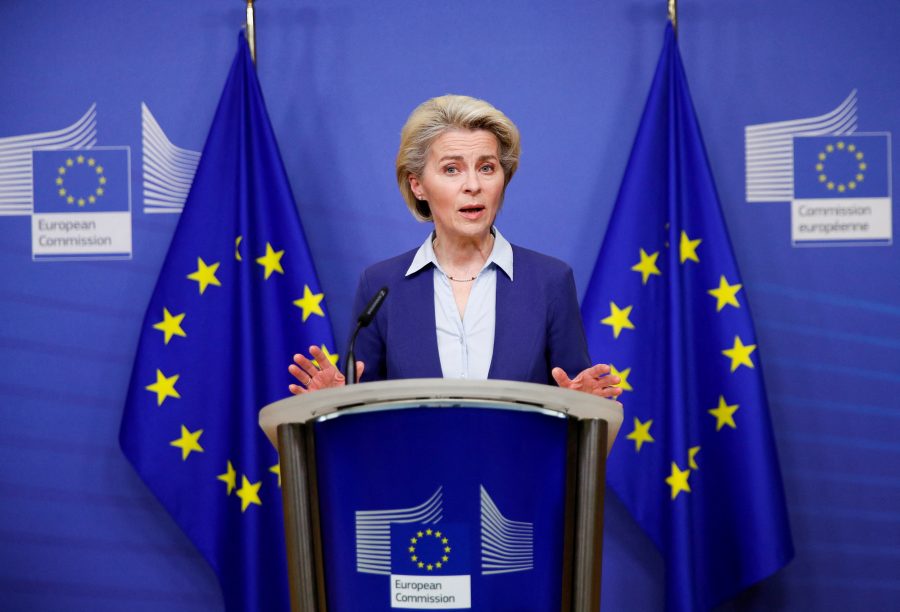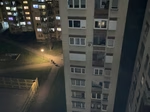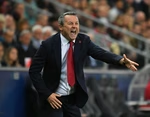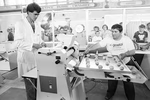Von der Leyen: Croatia's Eurozone, Schengen area entry proof of its hard work

Croatia's Schengen area and Eurozone entry is proof of its hard work and commitment, EC President Ursula von der Leyen said on the Croatian-Slovenian border on Sunday, and Croatian PM Andrej Plenković said that with those two achievements, Croatia had accomplished the deepest possible degree of integration with the EU.
Von der Leyen arrived on the no longer operating Bregana border crossing on New Year's Day in the company of PM Plenkovic, Slovenian President Nataša Pirc Musar, the two countries' foreign ministers and European Commissioner Dubravka Suica.
This is a day to celebrate, a season of new beginnings, von der Leyen told a news conference.
There is no place in Europe where this is more true than here, on the Croatian-Slovenian border, she stressed, calling Croatia's entry to the European area of passport-free travel and the Eurozone huge accomplishments for the youngest EU member.
They testify to your incredible journey, hard work and determination, von der Leyen stressed.
Europe will work to protect the Schengen area, which is constantly faced with challenges but must not be taken for granted, von der Leyen said.
In recent years some of the members of the Schengen area reintroduced border controls due to the migrant crisis and the coronavirus pandemic.
Schengen is a matter of commitment and mutual trust. In Schengen we rely on one another. And we know that we can trust you and rely on you, she said in a message to Croatia.
Speaking of the euro, the EC president said that it was the world's second most important currency that makes European countries stronger at the global level and was one of the greatest European achievements.
The euro coins minted in Croatia, with marten as a symbol, are a successful combination of national identity and European destiny, she said.
Addressing reporters, PM Plenkovic said that 1 January 2023 was a historic day of accomplishment of all of Croatia's strategic political goals.
"There is no deeper integration than this for Croatia, a country that 31 years ago was not internationally recognised", temporarily under occupation, he said, expressing gratitude to Croatian defenders, without whose "sacrifice and contribution", he said, there would be no freedom and democracy in Croatia today.
By joining the Eurozone and the Schengen area, as the only country to have achieved it on the same day, Croatia has become one of only 15 European countries that are members of those two integration projects as well as NATO, Plenkovic said, adding that he was glad that in 2022 Croatia also completed Pelješac Bridge, designed by Slovenian architects and built with the help of EU funds.
Croatia deserved to accomplish those goals, and after 1 January, nothing will be the same for it any more, Plenkovic said.
He expressed gratitude to the ministers who had worked on those goals and the police for protecting the border.
The police are ready to focus on protecting the more than 1,350 kilometre long external EU and Schengen area border, he said.
Croatia will not erect wire fences or barriers on that border, Plenkovic stressed, noting that Croatia would strongly support that policy.
Slovenian President Nataša Pirc Musar told reporters that she was truly happy about Croatia's entry to the euro and Schengen areas, stressing that integration was the only possible path for Europe and Western Balkan countries.
"Europe is our home. We have the duty to protect that home and make it comfortable," she said.
As a link between Slovenia and Croatia as well as Germany, von der Leyen's homeland, Pirc Musar mentioned Primoz Trubar, Slovenian Protestant reformer and "father of Slovenian literacy", who helped publish German-printed books in the Croatian language.
"Trubar crossed the borders of ideology and state, guided by the idea of Reformation, while we are guided by the idea of Europe," she said.
She stressed that history can connect as well as separate states, adding that there has been enough of history separating states in the region.
"I welcome the fact that there is again no border between Slovenia and Croatia. I am truly happy about it," she concluded.
At midnight on 1 January, after less than ten years of membership in the EU, Croatia entered the Schengen area thus joining 26 other countries with 420 million people in the world's biggest area of passport-free movement.
Border controls were abolished on land and sea border crossings to EU member states, while airport border controls will be abolished on 26 March.
In the new year Croatia has also entered the Eurozone, becoming part of a community of more than 342 million people who use the euro as their common currency.
Kakvo je tvoje mišljenje o ovome?
Učestvuj u diskusiji ili pročitaj komentare





 Srbija
Srbija
 Hrvatska
Hrvatska
 Slovenija
Slovenija
























































